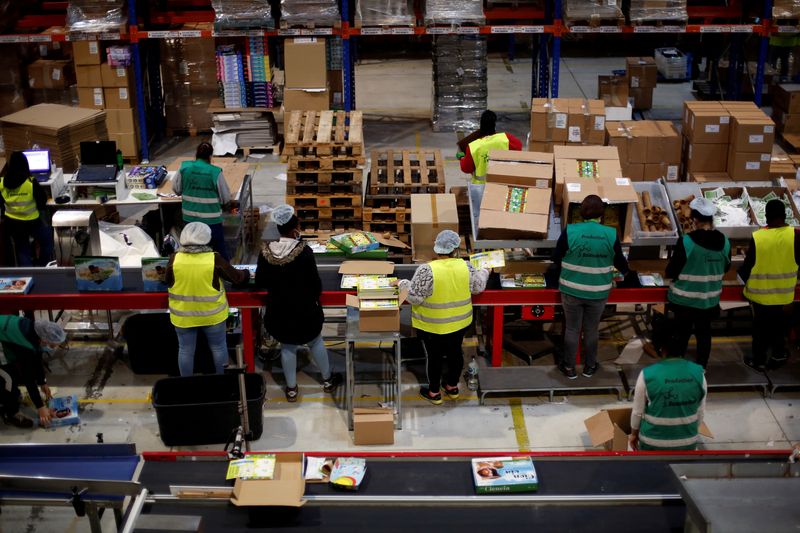By Jonathan Cable
LONDON (Reuters) -Euro zone businesses faced a tough start to 2024 with activity contracting again in January as demand continued to fall while price pressures rose due to tensions in the Red Sea, a survey showed.
The manufacturing outlook did improve somewhat but remained in contractionary territory and was partly offset by a steeper decline in the bloc's dominant services industry.
HCOB's preliminary euro zone Composite PMI, compiled by S&P Global, rose to 47.9 this month from December's 47.6, just shy of expectations in a Reuters poll for 48.0 but marking its eighth month below the 50 level separating growth from contraction.
"Today's data confirm our view that the economic weakness in the euro area will last longer than expected by the majority of economists and the ECB," said Christoph Weil at Commerzbank (ETR:CBKG).
According to a recent Reuters poll the bloc was predicted to expand 0.1% this quarter.
Germany and France, the 20-country currency union's biggest economies, both saw an improvement in their manufacturing PMIs but a deterioration in their services ones.
British services firms saw another pick-up in growth this month, adding to signs of a modest recovery in the sluggish economy, although struggling factories are now being hit by the inflationary impact of tensions in the Red Sea.
Attacks by Yemen's Iran-aligned Houthis in the Red Sea are disrupting shipping and the delivery times index in the euro zone factory PMI dropped significantly and was below 50 for the first time in a year.
The European Union faces a risk of consumer prices surging and growth slowing due to these disruptions, though it has yet to feel an economic impact, a top EU official said on Tuesday.
However, some of the upturn in the manufacturing PMI was driven by the sharp fall in the delivery times index as it has an inverted relationship with the headline number.
"Now, we have again issues with delivery times due to the Red Sea, this interpretation is indeed a bit misleading because the fall in the delivery index is considered positively in the headline index," said Cyrus de la Rubia, chief economist at Hamburg Commercial Bank.
INFLATION INFLATING
There was evidence of inflation creeping back up with both input and output price indexes rising. The output prices index rose to 54.2 from 53.8, its highest since May last year.
That will likely disappoint policymakers at the European Central Bank who are keen to get inflation back to their 2% target.
"Inflationary pressures are still quite high. This will be a concern for ECB policymakers, who are particularly focused on services inflation as a gauge of domestic price pressures," said Bradley Saunders at Capital Economics.
The services PMI fell to a three-month low of 48.4 from December's 48.8, confounding expectations in a Reuters poll for an uptick to 49.0.
However, optimism about the year ahead improved and the business expectations index jumped to 59.8 from 58.3. It was last higher in May.
Manufacturing activity, which the PMI suggests has been contracting since July 2022, declined again this month - albeit at a shallower pace. The headline reading bounced to 46.6 from 44.4, well ahead of the poll estimate for 44.8.

An index measuring output that feeds into the composite PMI also rose to 46.6 from 44.4.
While factories reduced headcount again, they did so at a shallower pace, indicating a trough may have passed. The employment index rose to 47.0 from 46.7.